#Richard is doing Amateur Shakespeare
Explore tagged Tumblr posts
Text
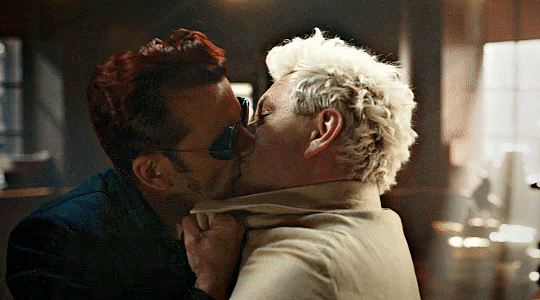
Okay I've thought about this as long as I can stand and--am I the only person who thought this was *awkward*?
I've been chewing on it, reading about other people's reactions, studying frame by frame the movements of Aziraphale's hands and like. I *see* it, I see how y'all get to the "brief moment of reciprocation" conclusion, but.
It is AWKWARD. It is one of the most awkward onscreen kisses I have ever seen.
Why is that??
The characters have chemistry. The narrative has established their relationship. The actors have chemistry; each of them has a proven track record of standout performances. And it's not as though either of them is new at this. So why, with all that on the table, does this look like amateur hour?
I got curious about it, and my hypothesis is this: they're reading from different playbooks.
"Saw it in a Richard Curtis film".
It feels like a throwaway line, something to wink-nudge a laugh out of the audience. There's a bit of confusion immediately afterwards regarding Jane Austen, Prolific Novelist and Jane Austen, Jewel Thief and Crime Lord, and isn't that funny haha look at the clueless celestial beings but almost NOTHING in this show has been just filler, or meaningless.
So who was Richard Curtis and why is he the model for Crowley's attempts at matchmaking? Turns out Richard Curtis directed some of the more iconic romcoms of the 90s and 2000s. I'm talking Notting Hill ("I'm just a girl, standing in front of a boy, asking him to love her", remember that one?); I'm talking Love Actually; I'm talking Bridget Jones Diary--which, funnily enough, is at the very least inspired by Pride & Prejudice. Sappy monologues and kissing in the rain is this guy's bread & butter.
Aziraphale, on the other hand, wants to try the Austen-esque approach of having balls. There were fairly rigid rules to courtship back in Austen's day. Rules that HAD to be followed, in the right order, or else face social ruin. Austen made her career out of poking fun at those even as her characters worked within them. Point is, you only get to kiss at the end, and one of you better be wearing a wedding dress.
I may be stating the obvious but I haven't seen anyone else talking about it so: one layer to Crowley's and Aziraphale's brainstorming session on how to get Nina and Maggie together is also their way of subtly indicating what they themselves find romantic, and would want someone else to do for them to demonstrate their interest. For Aziraphale it's dancing and atmospheric lighting and having everything just so and *conversations that clear up everything*. For Crowley it's tearful speeches and getting the chance to tell the truth while streetlights glitter through pouring rain, where the protagonists seem to be pulled into a showstopping kiss almost as of by magnetism alone. There's a formula to each of the kinds of romantic storytelling that inspires their different matchmaking styles.
For Aziraphale, The Kiss (because you know this bitch(affectionate) would use the Capital Letters for Emphasis And/Or Significance) skips several steps in the courtship dance he thinks they've been doing. From Crowley's Perspective, Aziraphale is three acts, two scenes behind from where *he* thinks they are. Their kiss looks awkward because they are desynchronized, out of step with each other.
In other words, and in many more ways than just the one, they are not on the same page.
But you know who these two numpties have in common?
William Fucking Shakespeare. My outlandishly speculative prediction for season 3 is their reconciliation will have something to do with Shakespeare's comedic works. The perfect turnabout would be modeling it on Much Ado, with Nina and Maggie playing the bits of Hero and Claudio in fabricating evidence to get them back together: Crowley and Aziraphale messed about with their lives, it's only fair they should get to dish it out.
#personal#writing#film#good omens#good omens 2#WE'RE GETTING SEASON 3!!!#not just a modern author aticking 2 paper dolls in romantic situations#I've been chewing on these thoughts like cud and haven't gotten any further than#“crowley thinks they're in a rom com and aziraphale thinks they're in a regency novel”#as in work written during or at least contemporary to the regency period#i leave them with you gentlw readers
31 notes
·
View notes
Text
I'm sorry but once you've seen one really superb physically disabled[1] actor play Shakespeare's Richard III, you absolutely cannot go back to watching an able-bodied actor play the role. Anyone else is going to suffer in comparison. Like, having seen Arthur Hughes play Richard at the RSC a couple of years ago, I'm hesitant even about rewatching Ian McKellen's film and a) that was made back when able-bodied actors playing Richard was more acceptable (I don't think less of Sir Ian for it), b) he's one of my favourite actors ever, c) until I saw Arthur Hughes, he was the best Richard I'd seen.
All of which is to say: Globe Theatre and Michelle Terry:-
what the actual fuck
you're better than this; you're literally having the glorious Francesca Mills play the Duchess of Malfi this year, how can you not recognise that casting the able-bodied artistic director of the company as Richard is an artistically and ethically shitty decision
sorry to Michelle Terry fans, but that overly percussive and rough-hewn verse-speaking and lack of subtlety or vocal variety? the last thing you need for Richard, even if she were disabled.
I am very angry and very disappointed. And also feeling very scathing as a disabled person, as a keen amateur actor and theatre-watcher, as a Shakespeare nerd.
Anyway. I'll watch that Duchess of Malfi if I get in a position to do so (Hughes as Bosola, also!), I'm not about to write off or "cancel" the Globe entirely over this, that would be stupid (and isn't what campaigners are asking for, especially as, I mean, part of the point is that they get enough actively right that them getting this so wrong is very out of left-field). But I can't see myself facing watching anything with Terry in it for a long while.
I am going to be rewatching Arthur Hughes' Richard at least once this year though! And relishing the thought. (It's on marquee.tv and digitaltheatre.com, if anyone's interested! <3 )
[1] Ideally visibly physically disabled, but I wouldn't insist on that.
#shakespeare#richard iii#tw ableism#disability stuff#arthur hughes#globe theatre#ugh michelle terry why#francesca mills#the ableds are at it again
13 notes
·
View notes
Text
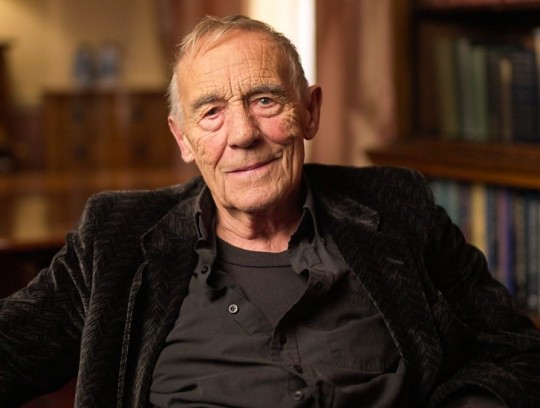
The actor Michael Jayston, who has died aged 88, was a distinguished performer on stage and screen. The roles that made his name were as the doomed Tsar Nicholas II of Russia in Franklin Schaffner’s sumptuous account of the last days of the Romanovs in Nicholas and Alexandra (1971), and as Alec Guinness’s intelligence minder in John Le Carré’s Tinker Tailor Soldier Spy on television in 1979. He never made a song and dance about himself and perhaps as a consequence was not launched in Hollywood, as were many of his contemporaries.
Before these two parts, he had already played a key role in The Power Game on television and Henry Ireton, Cromwell’s son-in-law, in Ken Hughes’s fine Cromwell (1969), with Richard Harris in the title role and Guinness as King Charles I. And this followed five years with the Royal Shakespeare Company including a trip to Broadway in Harold Pinter’s The Homecoming, in which he replaced Michael Bryant as Teddy, the brother who returns to the US and leaves his wife in London to “take care of” his father and siblings.
Jayston, who was not flamboyantly good-looking but clearly and solidly attractive, with a steely, no-nonsense, demeanour and a steady, piercing gaze, could “do” the Pinter menace as well as anyone, and that cast – who also made the 1973 movie directed by Peter Hall – included Pinter’s then wife, Vivien Merchant, as well as Paul Rogers and Ian Holm.
Jayston had found a replacement family in the theatre. Born Michael James in Nottingham, he was the only child of Myfanwy (nee Llewelyn) and Vincent; his father died of pneumonia, following a serious accident on the rugby field, when Michael was one, and his mother died when he was a barely a teenager. He was then brought up by his grandmother and an uncle, and found himself involved in amateur theatre while doing national service in the army; he directed a production of The Happiest Days of Your Life.
He continued in amateur theatre while working for two years as a trainee accountant for the National Coal Board and in Nottingham fish market, before winning a scholarship, aged 23, to the Guildhall School of Music and Drama in London, where he was five years older than everyone else on his course. He played in rep in Bangor, Northern Ireland, and at the Salisbury Playhouse before joining the Bristol Old Vic for two seasons in 1963.
At the RSC from 1965, he enjoyed good roles – Oswald in Ghosts, Bertram in All’s Well That Ends Well, Laertes to David Warner’s Hamlet – and was Demetrius in Hall’s film of A Midsummer Night’s Dream (1968), with Warner as Lysander in a romantic foursome with Diana Rigg and Helen Mirren.
But his RSC associate status did not translate itself into the stardom of, say, Alan Howard, Warner, Judi Dench, Ian Richardson and others at the time. He was never fazed or underrated in this company, but his career proceeded in a somewhat nebulous fashion, and Nicholas and Alexandra, for all its success and ballyhoo, did not bring him offers from the US.
Instead, he played Charles Lutwidge Dodgson (Lewis Carroll) in Alice’s Adventures in Wonderland (1972), a so-so British musical film version with music and lyrics by John Barry and Don Black, with Michael Crawford as the White Rabbit and Peter Sellers the March Hare. In 1979 he was a colonel in Zulu Dawn, a historically explanatory prequel to the earlier smash hit Zulu.
As an actor he seemed not to be a glory-hunter. Instead, in the 1980s, he turned in stylish and well-received leading performances in Noël Coward’s Private Lives, at the Duchess, opposite Maria Aitken (1980); as Captain von Trapp in the first major London revival of The Sound of Music at the Apollo Victoria in 1981, opposite Petula Clark; and, best of all, as Mirabell, often a thankless role, in William Gaskill’s superb 1984 revival, at Chichester and the Haymarket, of The Way of the World, by William Congreve, opposite Maggie Smith as Millamant.
Nor was he averse to taking over the leading roles in plays such as Peter Shaffer’s Equus (1973) or Brian Friel’s Dancing at Lughnasa (1992), roles first occupied in London by Alec McCowen. He rejoined the National Theatre – he had been Gratiano with Laurence Olivier and Joan Plowright in The Merchant of Venice directed by Jonathan Miller in 1974 – to play a delightful Home Counties Ratty in the return of Alan Bennett’s blissful, Edwardian The Wind in the Willows in 1994.
On television, he was a favourite side-kick of David Jason in 13 episodes of David Nobbs’s A Bit of a Do (1989) – as the solicitor Neville Badger in a series of social functions and parties across West Yorkshire – and in four episodes of The Darling Buds of May (1992) as Ernest Bristow, the brewery owner. He appeared again with Jason in a 1996 episode of Only Fools and Horses.
He figured for the first time on fan sites when he appeared in the 1986 Doctor Who season The Trial of a Time Lord as Valeyard, the prosecuting counsel. In the new millennium he passed through both EastEnders and Coronation Street before bolstering the most lurid storyline of all in Emmerdale (2007-08): he was Donald de Souza, an unpleasant old cove who fell out with his family and invited his disaffected wife to push him off a cliff on the moors in his wheelchair, but died later of a heart attack.
By now living on the south coast, Jayston gravitated easily towards Chichester as a crusty old colonel – married to Wendy Craig – in Coward’s engaging early play Easy Virtue, in 1999, and, three years later, in 2002, as a hectored husband, called Hector, to Patricia Routledge’s dotty duchess in Timberlake Wertenbaker’s translation of Jean Anouilh’s Léocadia under the title Wild Orchids.
And then, in 2007, he exuded a tough spirituality as a confessor to David Suchet’s pragmatic pope-maker in The Last Confession, an old-fashioned but gripping Vatican thriller of financial and political finagling told in flashback. Roger Crane’s play transferred from Chichester to the Haymarket and toured abroad with a fine panoply of senior British actors, Jayston included.
After another collaboration with Jason, and Warner, in the television movie Albert’s Memorial (2009), a touching tale of old war-time buddies making sure one of them is buried on the German soil where first they met, and a theatre tour in Ronald Harwood’s musicians-in-retirement Quartet in 2010 with Susannah York, Gwen Taylor and Timothy West, he made occasional television appearances in Midsomer Murders, Doctors and Casualty. Last year he provided an introduction to a re-run of Tinker Tailor on BBC Four. He seemed always to be busy, available for all seasons.
As a keen cricketer (he also played darts and chess), Jayston was a member of the MCC and the Lord’s Taverners. After moving to Brighton, he became a member of Sussex county cricket club and played for Rottingdean, where he was also president.
His first two marriages – to the actor Lynn Farleigh in 1965 and the glass engraver Heather Sneddon in 1970 – ended in divorce. From his second marriage he had two sons, Tom and Ben, and a daughter, Li-an. In 1979 he married Ann Smithson, a nurse, and they had a son, Richard, and daughter, Katie.
🔔 Michael Jayston (Michael James), actor, born 29 October 1935; died 5 February 2024
Daily inspiration. Discover more photos at Just for Books…?
13 notes
·
View notes
Text
A Piece of Work — Simon Russell Beale on a career spent playing Shakespearean roles
Simon Russell Beale’s memoir of a career spent playing some of the great (and many of the minor) Shakespearean roles, is as much a work of criticism as of autobiography. It is a better read for that.
By Cordelia Jenkins August 30 2024
“It is not the fashion to see the lady the epilogue,” says William Shakespeare’s heroine Rosalind, breaking character to speak to the audience at the end of As You Like It, written in 1599. Neither has it been the fashion, since then, to see the actor play the critic. In fact, the whole idea of character analysis in Shakespeare studies was out of fashion until relatively recently. But Simon Russell Beale’s memoir of a career spent playing some of the great (and many of the minor) Shakespearean roles, is as much a work of criticism as of autobiography. It is a better read for that.
At the age of 63, Beale can claim to be one of Britain’s most prolific and revered stage actors. The book is a patchwork of episodes from his life and sketches of the characters he has played over the years, starting with the lonely Roman, Cassius, and moving through some of the great comic and tragic heroes, Benedick, Richard III, Macbeth, Leontes and Lear.
While Beale is careful to avoid making claims to be “an academic, or even a genuine amateur specialist”, he confesses that he finds it impossible not to think of the characters he plays “as less than living, breathing men and women”. And when he breaks off from telling the story of his own life to deliver his observations on a particular role, the insights feel truer for being born of emotional, rather than purely intellectual, labour.
Beale is honest about the pitfalls of this approach. His interpretations are partial and deeply subjective. His chosen characters are typically loners or outsiders in some sense, looking for acceptance and, above all, redemption. And the themes he draws out from them are reflected in the telling of his own life story. It is easy, for example, to see what the appeal of joining a company of actors might have been to the son of an army doctor who had a peripatetic and often isolated boyhood.
His meditation on the crippling grief of Leontes, the jealous king who is responsible for the death of a beloved child, turns upon Beale’s memories of the death of his younger sister, Lucy, who suffered from a congenital heart defect and died at the age of four.
Readers may flag at the level of detail with which Beale describes his early career at the Royal Shakespeare Company and the National Theatre. But 30 years working in British theatre have given him an unusually acute understanding of the relationship between what he describes as the “work in the study and the work on the stage”.
He interrogates the centuries-long scepticism that actors have had for scholars, and vice versa. “I have met scholars who believe that Macbeth and King Lear should never be performed, because any attempt to do those plays justice will fail,” he writes, gearing up to dismantle that argument in his account of his own performance of Lear in Sam Mendes’ production of 2014.
In an interview with the FT this year about playing the part, Beale remembered a game with a fellow actor in which they habitually ranked “our top five favourites and our bottom five” of Shakespeare’s plays. “The bottom five were always the same. And the top five used to change, but Lear was always in them,” he said. It’s a revealing anecdote that hints at how consistent a presence Shakespeare’s plays have been through his career. A life’s work in fact — irrespective of the changing fashions.
Cordelia Jenkins is deputy editor of FT Weekend Magazine
A Piece of Work: Playing Shakespeare and Other Stories by Simon Russell Beale Abacus £25, 288 pages
4 notes
·
View notes
Text
I was curious to see the original context of these quotes, so I found “Loitering With Intent: The Apprentice” by Peter O’Toole online, and I was not disappointed. He uses a fun impressionistic style and he does describe this particular encounter in detail.
When Richard Burton strutted his Bastard on to the stage, he fetched with him a virility and poetry which neither before nor since have I seen matched in any playhouse. Power he brought, and insouciance; laughter, energy, danger; a rapidity of action and mental agility which throbbed; a relaxation and stillness which magnetized; an eye and a presence which commanded, and a glorious voice which rang and hushed and boomed and stung into every sounding inch of the auditorium. Much of what the Bastard says is a compound of slang, eloquence and yokel speech. Such was Richard's understanding of the very nature of the Bastard, and the skill he brought to the weight, nuance and balance of each word and phrase, that this mix blended into a singular essence which defined and made whole Shakespeare's reincarnated Lionheart.
[O’Toole goes on at length about the production and muses a lot about the history behind the play, etc. I’m skipping ahead.]
Nina Von [one of Peter’s theater student friends] made it clear that the rest of us could do as we wished but that she was going to the stage door in the hope of having a sumptuous ogle of Richard Burton, whom she considered to be a cute hunk of real man. No demur came from the heap and so round to the stage door we trooped where, pretty prospect, I saw that right next to it stood a welcoming pub.
[Skipping ahead again; they go to the pub.]
Hello. It is less than half an hour since the play ended. […I]nto the pub pushes what appears to be the entire cast of King John. The King of France has bought drinks and is passing them to Cardinal Pandulph, the Dauphin has his head dipped into a foam of Guinness and here comes Burton calling for a pint. They are a cheerful bunch, sparky, voluble, dry as one expected and the ale goes around and down. Here is Constance of Bretagne. Stern yet mischievous, handsome, and giving what appears to be a ribbing to a donnish and perplexed King John.
Burton has lifted his pint with an ease and sure-handedness that tells of diligent practice; parched ancestors from the coal pits of Wales live on in his sturdy body as the glass pint pot is applied to his mouth, and no miner up from the shaft after a double-header at the black coal face could have managed better his deep first sweet suck. Well played, Richard Burton! Laugh your easy laugh, light a fag, swig your ale, lean against the bar and look about you. Here sit six drama students, lately up in the gods, now come down to earth, sitting in a pub and looking at members of the Old Vic Company who this evening have so thoroughly entertained us when performing in a play. What my friends are thinking, I can't know. Me? The sight and sound of the chatter and the laughter made by you and your companions, and the ease with which you are all spreading yourselves about the pub, the warmth and vitality engendered, why, it delights me but though I can see and hear all this, I cannot yet touch it, am excluded, for you are professionals and I am not. Not at all, not even an experienced amateur. Not, in fact, an actor. And yet. Do I sense a tie of kinship? A tie which I have already sensed with my teachers at the RADA, professionals all? Perhaps. We will see. Meanwhile, though I am in a true sense excluded from it, I shall be happy on the fringe of your company.
Hello. Burton, R., is having a deep greeny-blue eyeful of [each of the three women in Peter’s friend group]. Can you blame him? These three bonny babes would fill a gladdened eye on any man […] Now, did you ever meet a young man who with complacency could watch while the women in his company were being given a thorough scrutiny by another young man in a pub? A stranger at that? An actor? A bloody film star? It was while I was adjusting my ears to their pinned-back position and mustering up one of my better grim scowls, that Richard took his gaze away from the women, glanced at Joe, at Bob, and then looked straight at me. A grin as big as it was friendly and as warm as it was wide spread over his face. His eyes sent a merry message which said that, on the whole, I could be in much worse company. He raised his glass to me, to my friends, we raised our glasses to him, and then with the grin still on him he ambled away to sit with Lewis and Philip of France at a table on the other side of the bar.
Six young drama students went happily home that night and Bob [Peter’s school roommate] and I drank bottles of beer and talked until dawn.
[Tune in next time for another early run-in. Here’s a picture of the Royal Academy of Dramatic Art (RADA) era Peter O’Toole.]

That winter of 1953 Richard Burton, back from his first foray in Hollywood, reigned supreme at the Old Vic. Tickets were like gold dust with the twenty-eight-year-old hailed as the new Olivier. A group of RADA students, O'Toole amongst their number, decided to see King John, with Burton playing Philip the Bastard. Taking it in turns to queue for cheap tickets they sat up in the gods, crackling with anticipation.
The curtain that evening fell to applause like thunder and O'Toole stepped outside into a cold, windy Waterloo Road almost traumatized by what he'd seen. “When Richard Burton strutted his Bastard on to the stage, he fetched with him a virility and poetry which neither before nor since have I seen matched in any playhouse.”
Conveniently located nearby was a pub and O'Toole's group made haste inside. He was halfway through his pint when Burton and other cast members bounded in, calling out for refreshment. O'Toole watched the Welsh wizard lift his pint with an ease and sure-handedness that told of diligent practice. It was a strange sensation to sit so close to actors who had entertained him so grandly, there was laughter, good humour, it delighted him, yes, “but though I can see and hear all this, I cannot yet touch it.” They were professionals, O'Toole was still very much the apprentice. At one point O'Toole distinctly recalled Burton catching sight of his own gaze and staring back with a grin, “as big as it was friendly. He raised his glass to me, to my friends, we raised our glasses to him, and then with the grin still on him he ambled away.”
- Peter O’Toole: The Definitive Biography by Roger Sellers [the direct quotes attributed to O’Toole are from O’Toole’s 1997 memoir Loitering With Intent]


^ Richard Burton in The Robe (1953)
#peter o’toole#richard burton#‘his deep first sweet suck’ a wordsmith lmao#loitering with intent#this really brings back the feeling of being a young artistic person in an excited artistic friend group. nostalgia.#peter and richard
15 notes
·
View notes
Note
FIC MEME: 41 - hose for Richard, Anne and Robert?
Anne wolf-whistles as her boyfriend gives a slow 360 degree turn, his long legs clad in bright yellow tights. Richard flashes a semi-nervous grin at her, eyes sparkling although his cheeks are somewhat pinker than normal. “Good?” he asks.
“What about the garters?” Robert askes lounging on Richard’s bed. “Aren’t you supposed to be cross-gartered? Also, are you going to be wearing anything other than your hose on your lower half?”
“I’ll have shorts or something,” Richard says, “Or maybe I’ll just. Sensually pull up my trouser leg, we haven’t quite worked it out yet. We might try a few different things. We haven’t worked out if we’re going for modern or not yet, so.”
“Pity,” Robert smirks, eyeing the bulge at Richard’s crotch. Anne claps her hands.
“Booty shorts!” she exclaims, “With Steward This on the back.”
“I love you.” Robert says, as Richard snorts a laugh and said,
“I’ll mention that.”
“Still, Malvolio,” Anne says, biting the inside of her cheek. “I’m sorry, I just- I’m having difficulty imagining you as. No Fun.”
“I have to second that,” Robert says, picking up the script from by Richard’s bed and flicking through it. It was all marked up in Richard’s sometimes neat, sometimes scrawling hand. “I mean not that I doubt your acting abilities- I’ve seen you pretend to be interested in your cousin bleating on about how the stock market works- but severe, cold natured, self-righteous prude doesn’t really seem like your style.”
“There’s more to Malvolio than that,” Richard argues, but then gives a shrugs. “Mostly, I’m just gonna channel Uncle John. Severe, Cold, thinks he’s the boss and doesn’t like parties is him to a G.”
“G?” Anne frowns. “Isn’t the idiom ‘to a T?’
“Yeah, but ‘T’ just seems so arbitrary? I mean if it was to a Z maybe, that’s all the letters- but T is completely random. I figured ages ago I was just gonna. Randomise my letter selection whenever I used that phrase.”
Anne’s expression softens in to one of extreme fondness. Robert chuckles. “I love you.”
“I love you too,” Richard grins, and pulls down his tights, balancing on his right and then his left foot to free each leg. “Throw me my jeans?”
“But you look so hot in your purple boxers.”
“Robert!” Richard huffs. “Anne?”
“Nope.” Anne sits down on the bed as well, leaning back on her hands and grinning. “I second Robert. You look way too hot for jeans.”
Richard huffs again, bending forward and grabbing his jeans from where he’d tossed them on his bed. Robert grabs the other side and holds on. “I will end you,” Richard threatens, tugging hard. “And worse- I won’t cook you dinner later this evening.”
Robert relinquishes his grip. Suddenly free of an equal and opposite reaction to his pulling, Richard stumbles backwards and ends up on the floor. “Ouch!” he exclaims. Anne throws her hands over her mouth, half in horror and half to stifle her laughter.
“Are you alright?” She asks.
“I’m fine. Mild loss of dignity but it’s not like that’s massively new.”
“Ooops,” Robert says ruefully. “Sorry.”
“Whatever. Your penance can be the washing up later.” Richard says. “For now- would you two mind helping me try and start learning my words?”
“Bagsy Olivia!” Robert grins. Anne rolls her eyes at him.
“Sure, we’ll help,” she says. “Where do you want to start?”
#my fic#a very lose definition of hose i'm afraid ;)#student au#(3rd year probably)#Richard is doing Amateur Shakespeare#no prizes for guessing which play
8 notes
·
View notes
Text
because I have nothing better to do with my time (besides, you know, law school final exams, three part-time jobs, cleaning my kitchen, etc) I am attempting to compile a list of all the books, poems, plays, ballads, etc, mentioned or quoted or referenced by everyone’s favourite obnoxious aristocrat Lord Peter Wimsey. Are you reading or rereading some Dorothy L. Sayers? Would you like to aid me in this pointless noble endeavour? Please help expand this list!
(books quoted in chapter headings count; books referenced in short stories count; anything by Jill Patton Walsh does not count)
so far I have:
Whose Body?
The Divine Comedy - Dante Alighieri
The Golden Legend - Jacobus de Varagine
Bleak House - Charles Dickens
The Ingoldsby Legends - Richard Barham
The Gondoliers - W. S. Gilbert
“A Child’s Hymn of Praise” - Jane Taylor
Pilgrim’s Progress
Book of Nonsense - Edward Lear
Uncle Remus - Joel Chander Harris (:/)
“The Sign of Four” - Sir Arthur Conan Doyle
Just So Stories - Rudyard Kipling (:/ again)
Dombey and Son - Charles Dickens
The Decameron - Boccaccio
“Kubla Khan” - Samuel Taylor Coleridge
The Adventures of Sexton Blake - Harry Blyth
Meno - Plato
Raffles: The Amateur Cracksman - E. W. Hornung
Clouds of Witnesses
Othello - William Shakespeare
“Lucy Gray” - William Wordsworth
David Copperfield - Charles Dickens
The Merchant of Venice - William Shakespeare
The Lay of the Last Minstrel - Sir Walter Scott
Northanger Abbey - Jane Austen
Hamlet - William Shakespeare
Atalanta in Calydon - Charles Swinburne
HMS Pinafore - W. S. Gilbert
My Two Countries - Lady Astor
Alice’s Adventures - Wonderland by Lewis Carroll
The Wallet of Kai-Lung - Ernest Bramah
“A Lecture Upon the Shadow” - John Donne
Biography for Beginners - E. C. Bentley
The Wonderful and Surprising History of Jack the Giant-Killer - Anonymous
Richard II - William Shakespeare
Child Ballad 65, “Lady Maisry,” - Anonymous
Manon Lescaut - Antoine François Prévost
120 notes
·
View notes
Note
Someone else got to my question, so I'm mixing it up in here. 😂 Top five ~fictional~ royals!
Thanks for the ask! 😊
In no particular order:
1. Pretty much all the monarchs from the Queen's Thief series by Megan Whelan Turner, but I have a particular soft spot for the Queen of Attolia - she who cannot allow herself soft spots, she who poisoned her husband by banking on him eating from her plate and taking her wine cup from her to drink, the same way he would have taken her throne and country...and thus dying from the poison she had laced the wine with, barely letting it touch her own lips.
2. Emperor Gregor Vorbarra from the Vorkosgian Saga by Lois McMaster Bujold. The ruler of three planets since he was five years old, he gradually develops throughout the series from an inexperienced young man being used by various factions in his court to outplaying them all and becoming the extremely capable, if burdened, emperor of a militarized feudal space empire...all without losing his mind or his humanity. A favourite quote: "Both of my parents died in political intrigue before I was six years old, a fact you might have researched. Did you think you were dealing with an amateur?"
3. Sabriel and Touchstone from The Old Kingdom series by Garth Nix. Benevolent necromancer queen and warrior berserker king defending their kingdom from the Dead and chaotic Free Magic and, in Touchstone's case, shaving off decades of his life to restore and maintain Charter Magic. Always trying to be there for their children, even when they have to put their royal duties first. So desperately in love with each other.
4. Irulan Corrino from the Dune series by Frank Herbert. Groomed by the Bene Gessiret to be the wife of the Kwisatz Haderach, she ends up married to Paul Atreides in order for him to take her father's throne...while fully aware that he's totally in love with Chani (who's become his concubine) and that Irulan herself has become meaningless and will never bear an Imperial heir. She's also an important historian and her works saturate the books of the main Dune series at least. I love her and I want to protect her.
5. Catherine the Great and Peter III from The Great, created by Tony McNamara. Catherine's trying to overthrow her husband and become the beneficent Empress of Russia, and is having a bit of trouble with it. Peter's a scary man-child who is also strangely compelling and just wants to be loved. They fight crime are immensely fun to watch (and write).
Honourable mentions:
Richard III as written by William Shakespeare. An utter bastard, but by god he's glorious to watch! 'Can I do this, and cannot get a crown? Tut, were it farther off, I'll pluck it down.'
Youko Nakajima from The Twelve Kingdoms by Fuyumi Ono, an ordinary high school student who is dragged into a fantastical world and ends up becoming the queen of one of the world's twelve kingdoms - and, even though her rule is mandated by heaven, she also has to figure out how to actually be a queen.
Padmé Amidala from The Phantom Menace. Fourteen year old monarch of a whole planet, which is actually the norm for Naboo??? Fantastic.
#answering ask#the queen's thief#queen of attolia#gregor vorbarra#vorkosigan saga#sabriel#touchstone#the old kingdom#irulan corrino#dune#richard III#youko nakajima#the twelve kingdoms#padme amidala#the phantom menace#catherine the great#peter III of russia#the great#the great hulu#hulu the great
143 notes
·
View notes
Text
reactions so far:
-nice chanting
-gloucester and the archbishop have some Beef
-did he just insult his wife
-“speak for yourself bc you spend your time sleeping around instead of going to church”
-okay i’ve been thinking this for MONTHS so i’m gonna say it: this actor (don’t remember his name but he played the duke of orléans in henry v) looks like benjamin bernheim
-“not in front of the body!”
-wait montjoy is in this????????? i thought this cycle was written first??????????
-probably just an editorial decision
-why do you have two dauphins in the same cycle played by the same actor
-still i love andrew jarvis
-oh hi montjoy
-see but this doesn’t make sense for the production. like esc henry v montjoy was a) not actually part of the military, b) gentle and dignified, and c) a total nerd
-okay just paused and looked this up and it’s actually some dude called the bastard of orléans, which is absolutely hilarious
-not sure why they conflated him with montjoy but okay i guess
-JOAN OF ARC!!!!!!!!!!!!!!
-yeah i remember this from the maid of orléans
-reignier’s double take at joan lmaooooooo
-also i love joan’s outfit
-FIGHT TIME FIGHT TIME FIGHT TIME
-this flute music is so cool
-GET HIS ASS
-the dauphin wants to tap that
-the boys are fightingggggggggg
-annnnnnnnnnnnd here we go (the roses)
-i love all their suits
-oh hey it’s the treason plot!
-everyone in england is an amateur genealogy enthusiast (i mean. for reasons. but yeah)
-these two continue to have Beef
-henry (i think?) is just sitting here like “what on earth are you two going on about”
-“thou bastard of my grandfather” is such a hilarious insult
-“rome shall remedy this!” “ROAM thither, then!” a++ pun
-awwwwwwwwww he’s such an earnest cinnamon roll
-also the fact that this guy played pistol…damn what a turnaround
-henry has a good point there
-gloucester doesn’t trust it and neither do i
-“so help me God, as i intend it not” LMAOOOOOOOOOOOOO
-“it is not just that a father’s sin should be so long revisited upon the son” henry v would like a word also henry vi looks so anxious right now oh baby
-the WHOLE rightful inheritance??? nice sentiment but if history tells us anything…
-seriously he’s just such a cinnamon roll
-eyepatch is cool
-oh hey it’s taps
-welcome back joan!!!!!!
-don’t call her a strumpet what is wrong with you
-once again: GET HIS ASS
-victory rally time!
-the dauphin is a SIIIIIIIIIIIIIIIIIIMP
-french accordion is french
-“did i just wipe my face with a dirty sock”
-“what was i supposed to do? i was literally ASLEEP and also of course you have to blame the woman for EVERYTHING”
-replace this scene with “your fault” from into the woods (change the words of course but yeah)
-talbot did not like getting kissed on the cheeks lol
-burgundy is regretting his life choices
-impeccable timing there joan
-is this flute music supposed to be “witchcraft”? bc i know that this play’s portrayal of joan of arc is…wrong
-yeah this may not be shakespeare at his best but it’s compelling
-you cannot make “countrymen” and “slaughtermen” rhyme
-joan’s smile is so cute
-monteverdi l’orfeo toccata jumpscare (but i think it’s the version from vespers to the blessed virgin? correct me if i’m wrong)
-he’s so jittery and cute
-“when i was young—as yet i am not old—“ *gloucester claps* lol
-my guy didn’t you never MEET your father
-dude don’t interrupt the coronation
-“they can talk it out then! and it’ll all work out!” henry 🥺
-wait who are these people
-oh is this the richard ii henry/mowbray scene all over again
-henry just wants peace poor baby
-GLOVE YEETING
-guys aren’t y’all in a church or something
-okay he has a point. infighting is going to help no one
-this is like high school drama
-just showing up at burgundy’s house in the middle of the night i guess
-york’s like “but *i* wanna be prom queen!”
-talbot flopped lol
-awwwwww it’s a family act
-somerset just lounging and vibing to jazz. love it. it’s a mood.
-also i continue to love siōn probert
-this messenger is busy
-okay talbot is actually a decent dad
-young talbot is DEPRESSED
-okay that was kinda sad
-what is this choral piece it’s pretty
-wait DID THEY BOTH DIE
-no dad is still alive but i think the son is dead
-okay now i’m crying
-STOOOOOOOOOOP
-okay i think he’s dead now too
-LEAVE THE WOMEN ALONE
-OH HELLO MARGARET OF ANJOU
-her dress looks like a wedding cake and the collar is really weird
-suffolk is SMITTEN
-also his mustache is something
-“fond man, remember that thou hast a *wife*.” THE WAY HE SAID THAT LMAOOOOOOOOO
-oh she can hear all his asides hahahahahaha
-“set her up with the king! there’s no way this can go wrong!”
-“he talks of wood. it is some CARPENTER!” the way i CACKLED—
-the SIDE EYE margaret is giving
-she’s so elegant
-suffolk: *kisses margaret “on behalf of the king”*
margaret: yeah buddy i know that’s for your own pleasure i can see right through you
-is this another edit? bc i thought that shakespeare had her talking to demons or some shit. admittedly though this is infinitely better and maybe i was mistaken
-oh poor joan 🥺 i wanna give her a hug
-she’s not an ANIMAL you can’t just capture her with a net
-TELL THEM OFF
-wait what? she’s not pregnant joan why did you just say that
-girlie you are BETTER than this. shakespeare what the fuck are you doing
-“sign it now, break it later” impeccable strategy there
-NOOOOOOOOOOOOOOOOO rip joan 😭
okay this feels like a good place to post
alright henry vi: house of lancaster (english shakespeare company) let’s go
thank you @shredsandpatches
7 notes
·
View notes
Note
I saw that no one chose [2]Shakespeare for your prompt fics. I admit I have gone overboard (because I love Shakespeare), so you can do whatever you want. Choose one, pick whichever sparks joy or completely ignore this. Here goes
1. Richard ii - A III. 2 let us sit upon the ground (jgy having a breakdown before the Guanyin temple scene)
- A IV. 1 Alack, why am I sent for to a king, deposition scene (JC convinces WWX to surrender himself instead of WQ+WN and a trial at Jinlintai ensues)
- A V. 5 I have been studying how I may compare/This prison where I live unto the world (WWX in the burial mounds)
2. Jin Ling as Hamlet (because his uncle murdered his father, see)
-A III. 1 Good my lord,/How does your honor for this many a day? (...) Oh, woe is me,/T' have seen what I have seen, see what I see! (WWX as Yílíng Laozu tries to push LWJ away)
3. Much Ado About Nothing (JC/Beatrice + Huaisang/Benedick - A III. 2-3 either one of the trick scenes)
4. Romeo and Juliet A III. 2 Give me my Romeo; and, when he shall die,/Take him and cut him out in little stars,/And he will make the face of heaven so fine/That all the world will be in love with night/And pay no worship to the garish sun. (XY & XXC)
5. A Midsummer Night's Dream - based on this Sam Rockwell scene from the 1999 film https://youtu.be/1TiNAYpVVr4 (some kind of reincarnation au vibes, where XY and XXC are amateur actors, and playing the suicide scene knocks something loose in his head)
- A III. 2 “Puppet”? Why so?—Ay, that way goes the game. fight scene (the juniors idk who the smallest in height is, but Jin Ling does seem to have a similar fiery temper; a night-hunt gone wrong maybe because of some interfering spirits)
6. Titus Andronicus - A II. 4; A III. 1; A V. 3 An if your Highness knew my heart, you were.—/My lord the Emperor, resolve me this (XXC discovers SL's mutilated body before it's turned into a fierce corpse and he kinda snaps)
7. MacBeth - A III. 4 banquet scene (jgy sees the ghost of NMJ)
-A V. 1 away damned spot (LXC in seclusion)
8. The Taming of the Shrew (instead of throwing him in the Burial Mounds, WC takes WWX with him and psychologically torments him with the same tactics as Petruchio; plot-twist: instead of being tamed, WWX kills him, because I hate TTOTS)
9. Othello A III. 3 (Othello/NMJ; Desdemona/LXC ; Iago/JGY; Cassio/NZH)
- A V. 2 It is the cause, it is the cause, my soul. - Oh, the more angel she,/And you the blacker devil!(...) I have another weapon in this chamber, - Oh, Desdemona! Desdemona! dead! Oh! Oh! (...) Soft you, a word or two before you go.-I kissed thee ere I killed thee. No way but this,/Killing myself, to die upon a kiss. (to DESDEMONA) I kissed you before I killed you. Now, killing myself, I’m dying while I kiss you again. Kisses DESDEMONA, dies (established relationship; JC realizes what NHS did at Guanyin temple and all the scheming before and is driven to murder)
10. Tom Stoppard's Rosencrantz and Guildenstern are Dead "Two ELIZABETHANS passing the time in a place without any visible character.bThey are well dressed—hats, cloaks, sticks and all. Each of them has a large leather money bag. GUILDENSTERN’s bag is nearly empty. ROSENCRANTZ’s bag is nearly full. The reason being: they are betting on the toss of a coin. (...) It would have been nice to have unicorns."+" Do you ever think of yourself as actually dead, lying in a box with a lid on it? (...) Eternity is a terrible thought. I mean, Where’s it going to end?" (JGY and XY in the afterlife, but they don't know it)
-"We could play at questions. (...) Yet he sent for us. And we did come." (JGY +NHS)
Now that's what I call a prompt! It was fun to have so many to choose from and to look at the different parallels you drew. I might be doing another, but this was the one that really caught my eye. Hope you like it!
(also on ao3 if you prefer to read there)
[gen; Lan Xichen; references to Macbeth; guilt and sleepwalking and blood]
- Spot -
In his sleep, Xichen walked.
There was nobody to see it, secluded as he was, and he himself was not aware. He only knew that he was tired every day, as tired as if he'd risen from his bed and paced back and forth for hours on end. The weariness felt fitting, though. He didn't deserve to sleep well.
He tried not to think about it. He spent a lot of his time now trying not to think about things; sometimes he succeeded.
Each night he went to bed at the prescribed time and lay staring into the darkness. Despite his weariness he always struggled to fall asleep - and the sleeplessness seemed to perpetuate itself. The longer he lay there, unsleeping, the less likely sleep became. Sometimes he didn't sleep until the room was turning grey with the approach of dawn, and sometimes he didn't sleep at all.
But when he did sleep there was no rest in it, and this was why: he would rise without waking and walk circles around the boundary of the home that had become a prison.
"Yet here," he mumbled, on one such night, words slurred and changing from dull to desperate and back again. "A spot!"
He wrung his hands together. He paced. If one were to look they might notice, as the months of his seclusion turned to years, the wearing of a path around the boundaries of the rooms: from door to bed, from bed to desk, from desk to door and around again. And again. And again.
"Hell is murky - out, damned spot! Who would have thought a man would have so much blood in him?"
He held up his hands as though to stare at them, though of course he saw nothing - or if he dreamed, perhaps in the dream he saw the stain of the guilt that lay upon them. Certainly the image of it haunted his waking hours. He was supposed to be spending this time in meditation, this seclusion, but each time he closed his eyes he saw his sworn-brother again and felt the hot spray of blood over his hands.
"No more of that," the sleepwalker told himself, soothing. "No more of - oh, but here's the smell of the blood, still! What perfume could sweeten this? Will these hands never be clean?"
His distressed cry rang out like a bird's call through the night. There was nobody to hear it. The elders of his sect slept easily with the weight of their decisions.
"Wash your hands," he said. His tone was gentle, as if he spoke to another, one he wished more kindness on than he would in waking choose to offer to himself. "Wash them and put on a clean robe. Look not so pale. He's buried! He cannot come out from his grave! Wash your hands."
There was no water in the wash-bowl but he knelt at it anyway and, as if enacting some elaborate mime, scrubbed at his hands. Come morning the skin would be red and raw - but there was nobody to notice how his hands troubled him now, and he did his best not to wonder why.
It didn't matter. What did he need his hands for? Let them ache. Let the skin crack and the joints swell. All his hands were good for any more were a weight when they sat folded in his lap, when he stared at nothing and feigned serenity.
"To bed now," he told himself then, rising with freshly-aching hands and eyes still unseeing. "Come, come, come - what's done cannot be undone. Dawn approaches. To bed."
And on the next night, and the one that followed, and on and on, he would rise to repeat the performance: pacing, scrubbing, muttering. Murmuring in distress but providing, too, the consolation that there was nobody else to offer.
Perhaps one day he would believe that he deserved forgiveness.
10 notes
·
View notes
Note
15, 19, 22, 37! :)
15. favorite “I will cause problems on purpose” character
There are so many of them! Does Falstaff count? I'm not sure he causes problems on purpose so much as his desire to just get drunk and screw around ends up causing them, but I love him. If he doesn't count, I guess Richard III who definitely does.
19. favorite magical or supernatural element or character?
I've always kind of wanted to play Ariel although I will absolutely never get to (I mean, I think I did in Social Shakespeare but I'm not actually sure, I used to do a lot of Social Shakespeares)
22. worst parent(s) (let’s be real we all need several)
He's a dark horse candidate because he's from a play nobody ever reads but Antiochus from Pericles has this pretty well wrapped up.
37. have you ever performed or been involved in a production of a Shakespeare play?
I've been in a lot of readthroughs of them (I used to co-organize a Renaissance drama reading group in grad school, and I was a Social Shakespeare regular before I moved in with my sister) and I've done workshops of scenes, but I've never actually been in a real onstage performance, albeit not for lack of trying. I think I'm a reasonably capable actor and I definitely understand the verse but it's surprisingly hard to find places to do amateur Shakespeare in the US once you're out of college and also people don't want to cast fat people in anything. Maybe someone will need someone to play Juliet's nurse sometime, that's probably the only role I could ever get.
6 notes
·
View notes
Text
Juliet Immortal (2011) Review Part 1
A fantasy time travel AU Juliet/Benvolio fanfic with intense Romeo bashing that somehow managed to get professionally published. I had avoided it like the plague if just for the Romeo bashing alone (don’t you dare touch my tassel-gentle!!!) but since some reviews said his POV parts were paradoxically the best of the book, I decided to chance it. But ho boy, this is a doozy
So the premise of this book is that the tale of R&J as we know it is actually a ~poetic lie by Shakespeare. The “real story” is that Romeo betrayed Juliet to supernatural entities called the Mercenaries and locked her in the tomb. Juliet is rescued by the Nurse, who as it turned out is another kind of supernatural entity called an Ambassador dedicated to uniting people with their soulmates. Juliet joins them and for 700 years takes over bodies of troubled humans and tries to match them with their soulmates/true loves. Romeo is the antagonist Mercenary and tries to do the opposite, convincing one half of the soulmate partner either to die or murder the other half, I’m not sure. An angel/devil thing, in short. The plot concerns Juliet taking over the body of a troubled outcast called Ariel. Her target is uniting Ariel’s best friend Gemma with her soulmate, a Mexican-American boy named Ben. Romeo, meanwhile, has taken over the body of bad boy Dylan. As to how that goes, well…let’s just begin.

Juliet is the sun to Romeo, not the moon. As in, “It is the East, and Juliet is the sun!” How the fuck can you mess that up? Already you can sense the depth of this author’s understanding of Shakespeare.
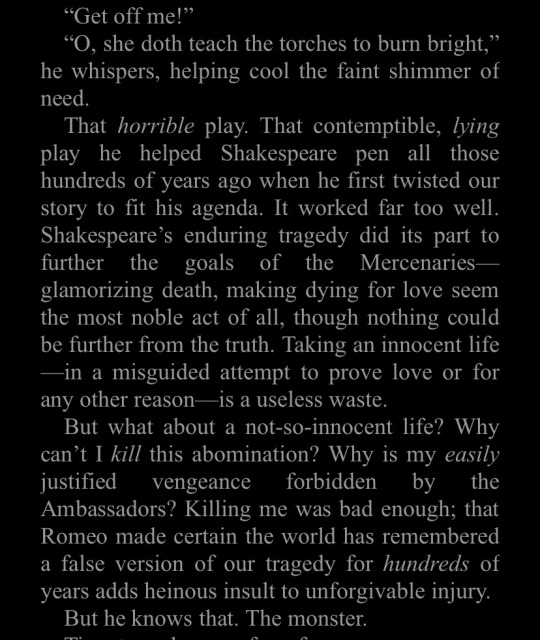
There are so many things wrong with this, I literally can’t describe it
The play apparently glamorizing suicide aside (it does not!!!), what is with this “taking an innocent life” bullshit? They did not murder one another, they committed suicide, and they were driven to it not by their love so much as fate, chance, and their parents’ destructive feud.
Also, the very idea of Romeo telling Shakespeare the story is laughable.
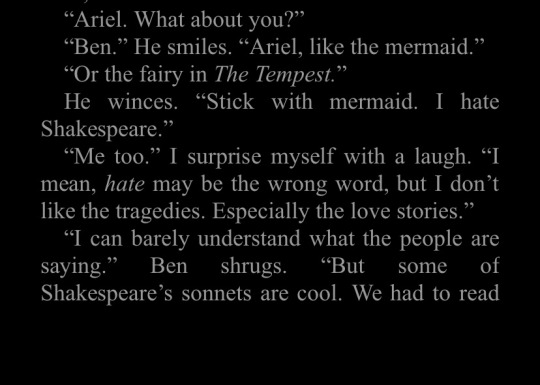
Ah, yes, Shakespeare bashing is 100% what I’m looking for in my Shakespeare published fanfic (die, die, die)

So the insta!love for Romeo was stupid, naïve, and destructive, but with Ben it’s True Love(tm)? *sips a Coke can* Interesting
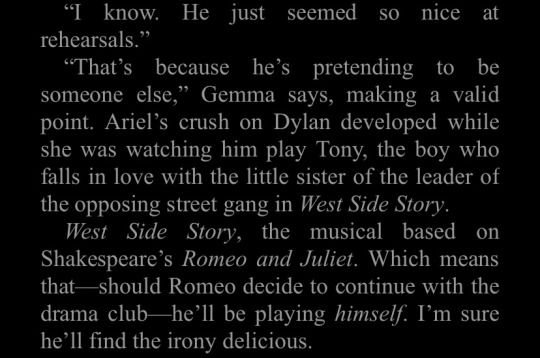
Author doesn’t understand what adaptations are Part 283992847399. Presgurvic would have worked so much better if just for this reason. At least they would have been playing the actual characters.
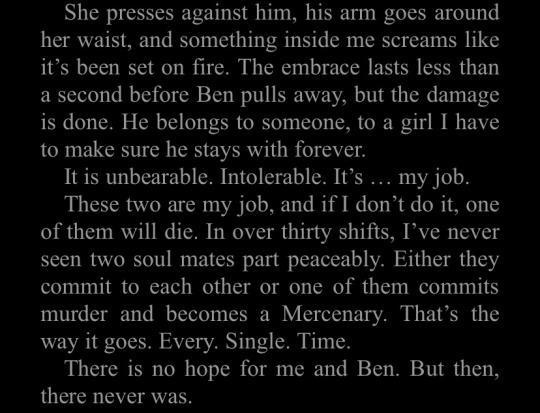
Obvious plot twist is obvious! Book, could you maybe work a little more?
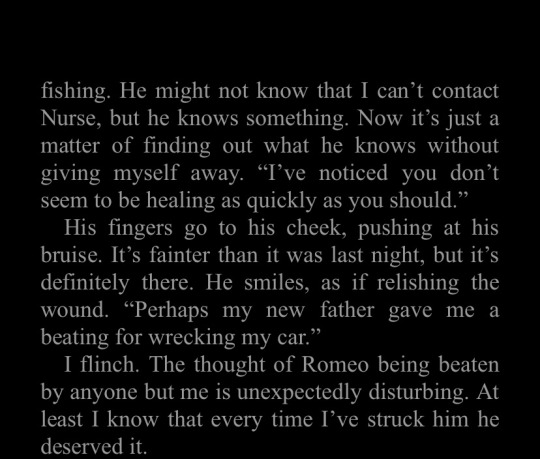
Possessive!Juliet, much? Why does Juliet still have chemistry with Romeo, who is portrayed as monstrous and the son of Satan? Be consistent, book! Don’t you give me that “enemies with benefits” vibe (or actually, do. Now that would be more interesting). It's such a cuttease
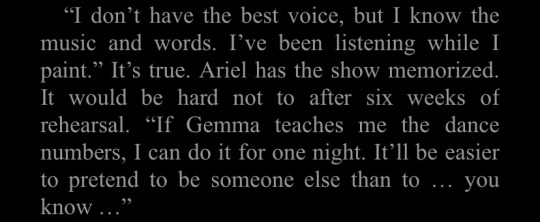
Bernstein’s score and Jerome Robbins’ choreography is!!! not!!!! for!!! amateurs!!!! Hell, it isn’t even for high school, unless that high school has the best and most funded drama department ever. Again, Presgurvic would have been more accessible. Not that I'm complaining; I always love any and all West Side Story references.
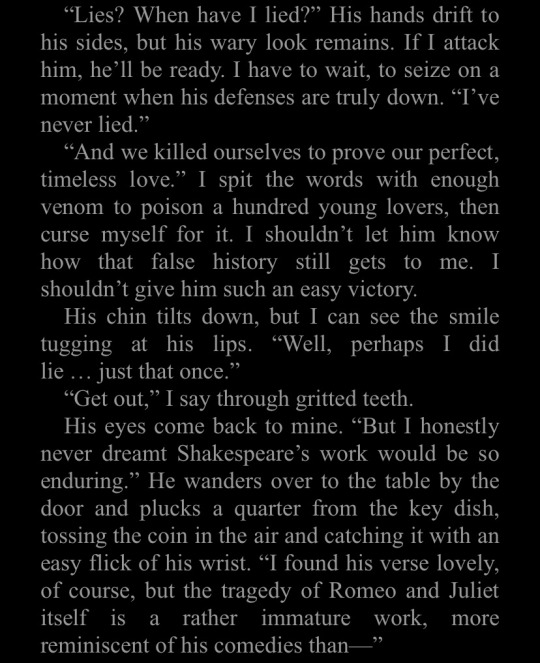
The problem plays, all of his collaborated plays, a huge chunk of the English histories, all of the Roman histories, and some of the comedies are inferior to R&J. Hell, the two Richards, Richard III and Richard II felt more amateurish and their verse was much less powerful. R&J is Tier 1 or at least Tier 2 Shakespeare. This is some author mouthpiecing going on.
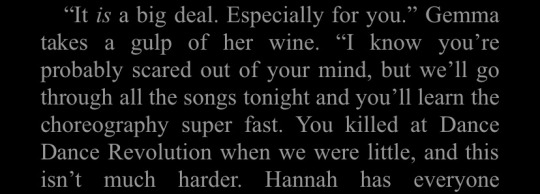
If you listen very carefully, you can hear Jerome Robbins elegantly rising from his grave to smack a bitch.
#romeo and juliet#cristina reads juliet immortal#juliet immortal#o heavy burden#cristina reads#cristina reviews
6 notes
·
View notes
Photo
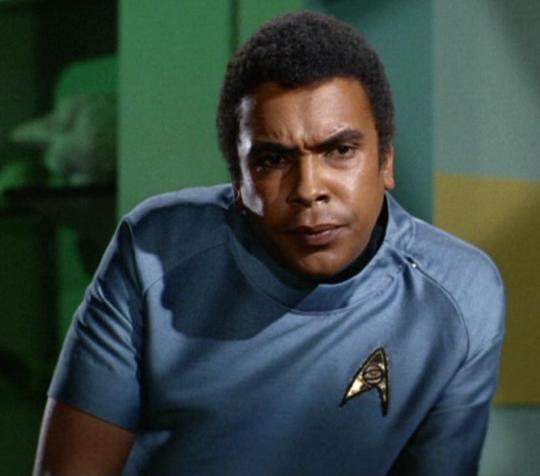
Look at that deadly serious face. Would you believe there are two amusing stories involving this gentleman? One from a scene involving his character, the other involving the actor behind the scenes.
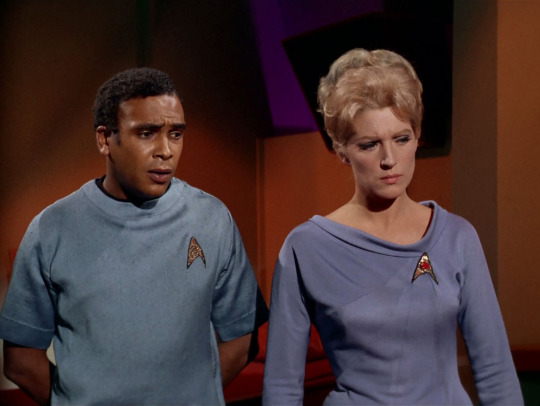
The idea to bring in a doctor specifically trained in Vulcan medicine was a good one. But we were not introduced to Dr. M’Benga until halfway through the second season in an episode titled “A Private Little War.” It is because of his expertise that we know all those bizarre life scan readings are merely a sign that Spock is concentrating his efforts on healing the severe gunshot wound he had received on the planet.
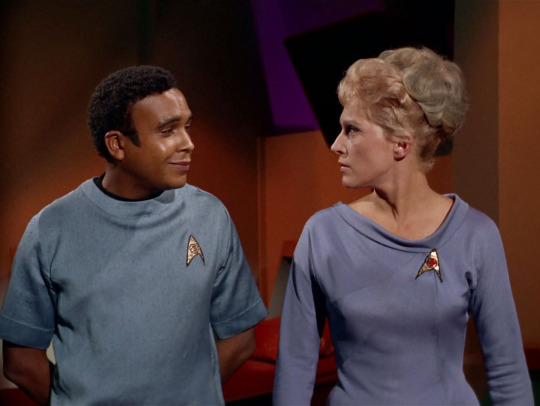
Up until this point, we have only seen the stern, serious side of M’Benga. But we find in this scene that he has a wicked sense of humor (and an excellent sense of observation). He informs Nurse Chapel that Spock has been conscious enough the entire time and most likely even realized Christine had been holding his hand earlier. And then you see this little grin as poor Nurse Chapel looks mortified and more than a little miffed.
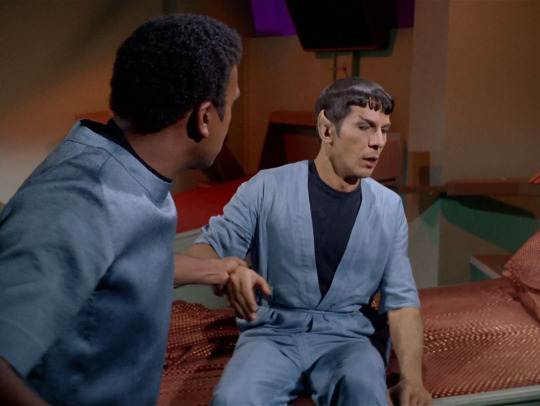
There is one other scene that is not exactly amusing in itself, but has an side story that is. This is the scene where Dr. M’Benga gives Christine explicit instructions about what to do if Spock shows any signs of consciousness. But when the time comes and Spock commands her to hit him as hard as she can, Christine just can’t do more than a weak slap. Then Scotty enters and when he sees what is happening, pulls her away. It’s up to Dr. M’Benga to bring Spock back to full consciousness.
Which he proceeds to do by pulling his arm back... and delivering a wallop of a slap that even Scotty would be proud of.
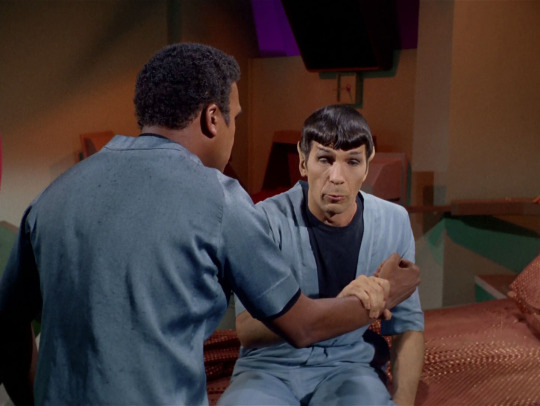
And which Spock calmly deems quite sufficient. But Leonard Nimoy was actually pretty irate just after the slap. The filming of this episode was already behind. While the crew set up for this scene, Leonard Nimoy pulled the actor Booker Bradshaw aside and told him he didn’t want to have to reshoot the scene (because he had a paid appearance scheduled that evening). So according to Bradshaw, Nimoy told him no stage slap - to give it everything he had. So... when the time came, Booker Bradshaw wound up and delivered a slap so hard, it knocked Leonard off his feet. And the Vulcan ears off Leonard. Which sent the stage crew and everyone else on the set into peals of laughter but Nimoy did not see the humor at all. Bradshaw said to his dismay, the star was quite angry and made it clear that this time, he better make it a stage slap.
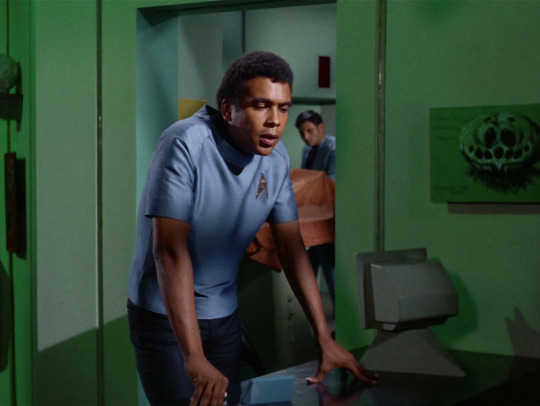
We see him one more time in “That Which Survives” when he is asked to find the reason Ensign Wyatt died. Dr. M’Benga replies that Dr. Sanchez (in the background) is already performing the autopsy and promises to report the results to Mr. Spock as soon as he knows them.
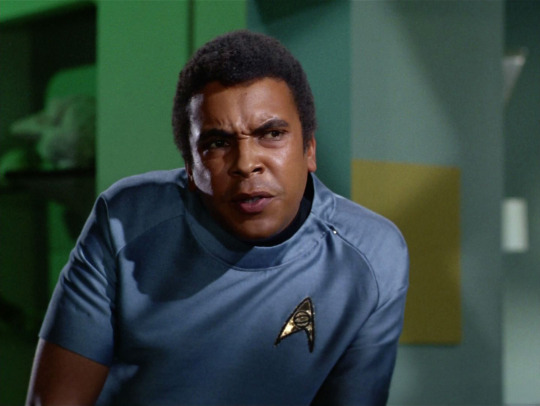
Later, Dr. M’Benga’s expression demonstrates his exasperation at not being able to give Mr. Spock an explanation for Wyatt’s cause of death, which Dr. Sanchez had established as cellular disruption. And that’s the last time we see Dr. M’Benga. Memory Alpha seems to think that Dr. M’Benga was meant to be there from the start and that M’Boya was simply a misspelling of his name in that first draft. Yet according David Tilotta in an article on StarTrek.com, Dr. M’Benga was not added to the cast of “That Which Survives” until a few days before filming. In the very beginning, the doctor’s name was given as M’Boya. Then as the script revisions progressed, the character of Dr. M’Boya was dropped and his lines given to Nurse Christine Chapel.. But Marc Cushman’s These Are the Voyages: Season Two backs up what David Tillota wrote, saying that one of the researchers from Kellam de Forest suggested to Fred Freiberger that the name should be changed to M’Benga on September 13th. However, he makes no mention of the previous change of M’Boya to Nurse Chapel doing the autopsy. Still, it does seem likely someone would have realized there was no need to create a new doctor when Dr. M’Benga had already been established as highly regarded by his CMO. Story Editor Arthur Singer turned in a final draft on September 20th and page revisions were added on the 21st. Once Fred Freiberger made a few more changes and created the revised final draft dated September 24th and the page revisions were inserted the next day. Just in time for the first day of production which again backs up David Tilotta’s assertion that Dr. M’Benga was close to a last minute addition/revision.
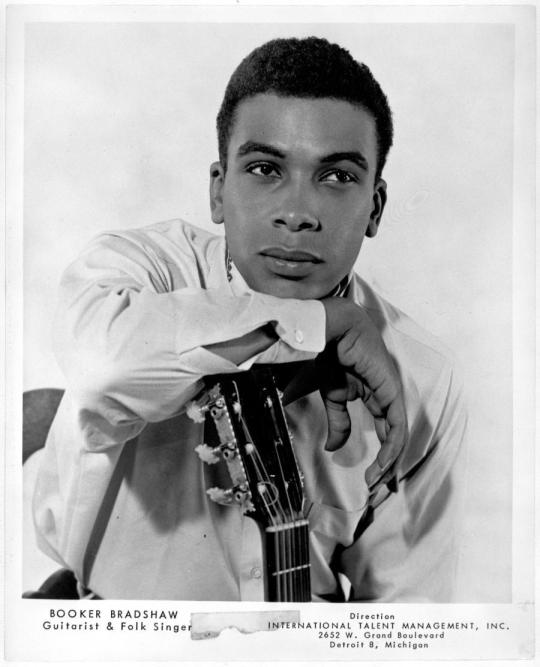
Dr. M’Benga was played by Booker T. Bradshaw of Richmond, Virginia. Bradshaw’s background is quite impressive. After working at his father’s life insurance company, Booker decided this was not the life for him and entered Harvard University. During his junior year he appeared on the Ted Mack Amateur Hour as a folk singer. Not only did he win three times, but he made it to the finals at Madison Square Garden. Booker did return to graduate from Harvard in 1962 with the intention of becoming a lawyer. Fate intervened in the form of a Fellowship at the Royal Academy of Dramatic Arts in London but not before he had performed at Carnegie Hall. Bradshaw did receive an honors certificate for his time at the Academy of Dramatic Arts which he completed by touring England with his Academy students as part of a Shakespeare repertory theater. *photo credit: http://quod.lib.umich.edu/b/bhl/x-hs8414/hs8414
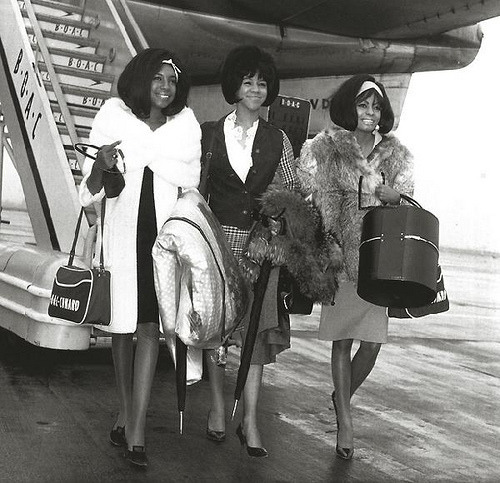
After finishing the Royal Academy of Dramatic Arts, you would think Booker would head straight into the acting world, wouldn’t you? Oh, he had done some stage plays in Harvard and a few other venues, but another opportunity arose. Bradshaw’s connection in the music world lead him to working for Motown Records in Detroit as their international manager. He specifically arranged the European tours of both the Supremes and the Temptations. According to several stories he could speak anywhere from three to nine languages, depending on the source. Above is a photo of the Supremes as they were about to start their 1965 European tour in London. Not only did Bradshaw serve as their manager but he also did an interview with them that was reprinted here - https://motownjunkies.co.uk/2013/03/02/589
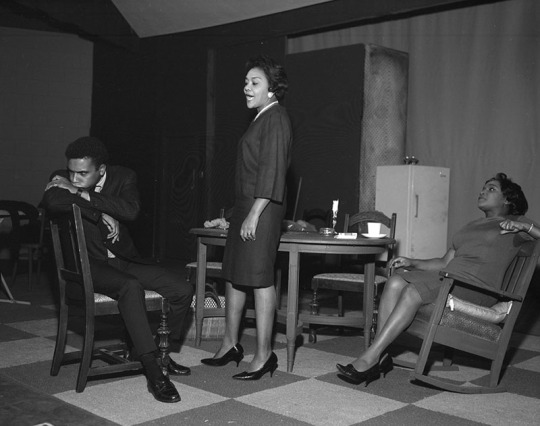
Around 1967, Booker Bradshaw came back to the United States to resume his acting career and joined a repertory theater in Rochester, Michigan run by one of his mentors, John Fernald. Fernald was formerly Head of the Royal Academy of Dramatic Arts. Bradshaw even wrote the lyrics and music for a play produced there titled And People All Around, which was based on the murders of three civil rights workers in Mississippi. He also appeared in several plays at the Ebony Showcase Theater, including Day of Absence and Happy Endings in 1967. One of his co-stars in both plays was Isabel Sanford. Some of you may remember her as Louise Jefferson in The Jeffersons, which ran from 1975-1985. The Ebony Showcase Theater was the first black theater created especially for black audiences in Los Angeles. Above - Booker Bradshaw, Juanita Moore and Isabel Sanford (Louise Jefferson) in Happy Endings. Photo credit - https://filmismemory.wordpress.com/2015/12/29/the-ebony-showcase-theater/
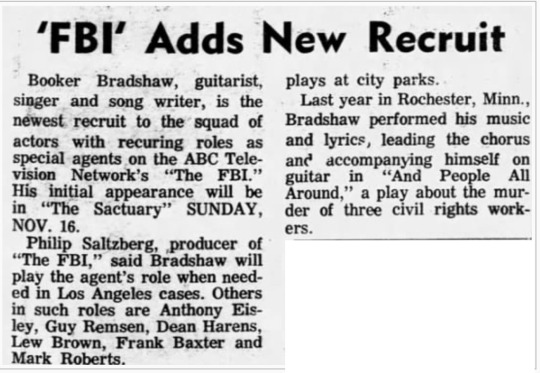
Booker Bradshaw went on to have a very full and successful career in television and film, both as an actor and as a writer. He landed parts on a number of television shows, including several episodes of Tarzan, the Mod Squad, and The F.B.I. In fact, as this newspaper clipping shows (which was actually a press release that appeared in many newspapers across the U.S.), it was thought his role as Special Agent Harry Dane might be a semi-regular one. However, he is only credited with appearing in two episodes. *clipping from p. 35 of The Jackson Sun (Jackson TN), November 7, 1969.
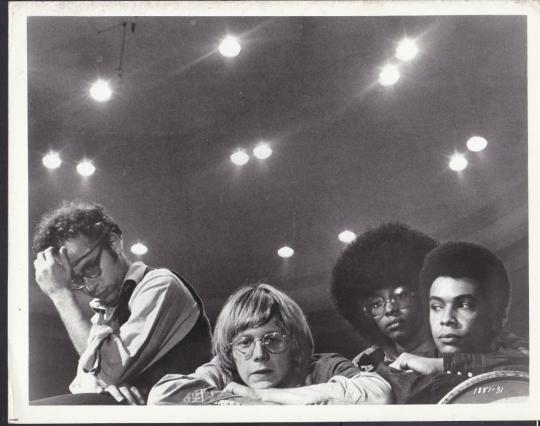
Bradshaw’s movie appearances were fewer, but included two that attained some notice at the time they were released. Above is a publicity photo from The Strawberry Statement (1970) which was loosely based on the Columbia University protests of 1968. He played the character Lucas who is seen on the far right. Fellow Star Trek actress Kim Darby was the female lead named Linda.
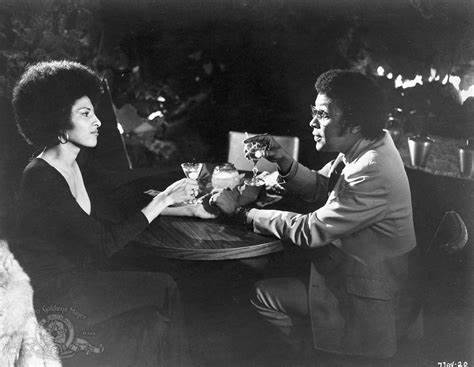
But Booker Bradshaw’s biggest role probably was that of politician Howard Brunswick in Coffy (1973). He was the boyfriend of the title character played by Pam Grier. She played the title character, a nurse who is out to get revenge on the drug dealers who were responsible for the death of her sister. Being a folk singer/media mogul/ theater actor/TV & film actor was evidently not enough. Bradshaw also became a quite accomplished television writer. Between 1973-1976 he and David P. Lewis together wrote scripts for shows like Columbo, Planet of the Apes, and McMillan and Wife. Bradshaw went on to do scripts for Different Strokes, Gimme A Break, and four episodes of The Richard Pryor Show. During the 80s he became a voice actor. Sadly, his impressive career came to an end when he died suddenly of a heart attack in 2003.
#Star Trek TOS#Dr. M'Benga#A Private Little War#That Which Survives#Booker Bradshaw#Booker T.Bradshaw
86 notes
·
View notes
Note
1. Who do you think is the most historically maligned figure from the Wars of the Roses? 2. What is your favourite 15th century fashion? 3. If there was any other historical period you could learn more about, what would it be?
Anonymously message me (3) things you want to know about me: https://lady-plantagenet.tumblr.com/post/624908501545893888/anonymously-message-me-3-things-you-want-to-know
I see you’ve noticed that I was the anon on yours 😉. Thank you so much for giving me this opportunity to overshare ;)
1. The most maligned figure is hands down *drum roll of predictability* George Plantagenet, Duke of Clarence. Assuming we are speaking of our contemporary opinions, these are the figures which are famously maligned:
Margaret Beaufort, Elizabeth Woodville, George Duke of Clarence, Richard Neville Earl of Warwick and Richard III.
Open any amateur historical fiction novel or popular history work written in our time and you can be sure that at least one of those is a moustache twirling villain. Of course, Richard III now has an entire franchise depicting him as a saint and focal point so maybe he shouldn’t be in the list. Elizabeth Woodville has The White Queen legacy and a bunch of biographies protecting her, some even going so far as to clear her name almost to the point of whitewashing (no Desmond, Thomas Cooke, Lambert Simnel participation etc) her to just a grieving mum.
Now Margaret Beaufort and Warwick also get the short end of the stick. The former gets allocated the blame of the Princes of the Tower and being a scheming, ambitious, religiously fanatical mother-in-law from hell. The latter is depicted as an opportunist man without principle who uses his daughters like livestock (even though they were all he had so it’s bs) and rebels just for the sake of rebelling. Nevertheless, the writers/general public never fail to acknowledge their genius and intelligence. Not to mention, they each have their fair share of biographies which have done much to change public perception of them (e.g. Nicole Tallis and J. Kendall)
Whereas George... Shakespeare made him relatively nice but also quite dumb, whereas all successor fiction go a step further and make him evil and dumb. You know, one wonders how the only man alive to have betrayed and outsmarted both Edward IV and Warwick could possibly have been so dumb. I won’t go in much detail here, but contemporaries such as Crowland Chronicles have noted his ‘talent and an intelligence that rivalled his own brother’s’ and how his legal arguments were a match against his brother Richard’s during the Neville Sisters inheritance dispute. I will no doubt be posting more once I get my hands on the Hicks biography.
Historically, George was quite ruthless, yes, but the following that I have read him do in fiction are just... what: a) Planning on murdering Anne Neville, b) Poisoning Isabel in order to marry Mary of Burgundy, c) Injuring Richard and causing his sclerosis(???), d) beating his wife... shouldn’t there be a libel law against dead people...? Because there really really should be. Not to mention most scholars treat him as utterly inconsequential as if it was not him who by 1478 remained a popular icon and the greatest threat to the crown.
2. My favourite 15th century historical fashion? Ooof you came to the right place!

A lot of them are here in this picture:
1. The Burgundian gown with fur trim will always be a favourite. Cruelty aside, I personally always loved the elegant effect fur has on one’s outfit.
2. The pointy poulines (the shoes) have reached stupendous lengths by the 15th century. They are an example that one does not need heels to be sophisticated. Not to mention they would be harder to walk in than heels (noblepeople of that time were trained from a young age to adopt a certain gait).
3. Conical Henins, the taller and more untenable the better. Like the one in the picture and this:

Honourable mention goes to: The Houppelande, the chaperon, the heart-shaped henin and mens’ hoses. I like how fashion then was more of an art and form of expressing one’s opulence rather than todays’ focus on sexualising womens’ bodies.
3. Another historical period I would like to learn more about would probably be 15th century Wallachia and Moldova. It was a tumultuous time of internal conflict against the wider Ottoman threat. Also, it feels close to me because my ancestors were involved!
Another time would be 19th century Austria-Hungary/German history, as I’ve always found Elisabeth Empress of Austria a fascinating figure and I love learning about the end of eras. In this case it would be the beggining of the end of the Habsburg empire!
An additional time would be the Angevin period in English history, I am particularly interested in Eleanor of Aquitaine, John I and Geoffrey Duke of Brittany and the internal family struggles and loss of French territories!
#🍷❤️#george of clarence#wars of the roses#as you can tell I really enjoyed doing this!#love you for asking me this#thank you#medieval fashion
9 notes
·
View notes
Text
ELLEN CORBY
June 3, 1911 - April 14, 1999

Ellen Hansen Corby was born in Racine, Wisconsin, in 1911, just two months before Lucille Ball. An interest in amateur theater while in high school led her to Atlantic City in 1932, where she briefly worked as a chorus girl. A year later she moved to Hollywood. She spent 11 years as a script clerk and doing extra work. Corby is best remembered for the role of Grandma Walton on the CBS series “The Waltons” (1971-81) for which she won three Emmy Awards. She was also nominated for an Academy Award and won a Golden Globe Award for her performance as Aunt Trina in I Remember Mama (1948). That film also featured “Lucy” performers Florence Bates (Mrs. Pettebone) and Rudy Vallee.
In addition, she appeared in Alfred Hitchcock’s Vertigo (1958), Sabrina (1954) starring William Holden, and the perennial holiday favorite It’s A Wonderful Life (1946) with Lucy character actors Charles Lane and Sheldon Leonard.
Besides being the same age, Corby started film acting in 1933, just like Lucille Ball, and entered television around 1950, just like Lucy. Both became two of the medium’s most cherished female stars.

Lucy-lovers fondly remember Corby as Miss Hanna, Lucy McGillicuddy’s high school drama teacher from Jamestown in “Lucy Meets Orson Welles” (ILL S6;E3) in 1956.

Miss Hanna traveled to New York City just to see Lucy perform Shakespeare with Orson Welles - not knowing that she is merely the assistant in his magic act.
Two years before her Oscar nomination for I Remember Mama, Corby did two films with Lucille Ball.

In The Dark Corner (1946), Corby she played a new maid who meets a nasty ending her first day on the job.

In Lover Come Back (1946), she played Lucille Ball’s secretary. The cast also included Charles Winninger, who played Fred Mertz’s old vaudeville partner, Barney Kurtz.

During the first season of “The Lucy Show” in 1963, Corby played a Woman in the Park (with Benny Rubin), who watches in disbelief as Lucy Carmichael (in her bathrobe and slippers) wildly chases an escaped butterfly, wreaking havoc as she does!

A few months later, Corby returned to “The Lucy Show” at the start of season three (now filmed in color), to play Miss Tanner, Danfield Bank secretary. This episode also marked the debut of Gale Gordon as Mr. Mooney.

Corby and Ball were both in attendance for “The All-Star Party for Carol Burnett” on December 12, 1982. Corby was essentially ‘in the audience’ and did not speak, while Lucille Ball was there as a former honoree and Burnett’s mentor.

When CBS celebrated their 50th Anniversary with a week of specials titled “On The Air” the Sunday night, March 26, 1978, kick-off featured CBS stars from each evening of the week in a grand parade. Naturally, Lucille Ball represented Mondays, while Corby joined the Thursday group representing “The Waltons.”
The Corby Connection!
During her long run on “The Waltons” Corby acted opposite several “Lucy” alumni.

Helen Kleeb played Miss Mamie Baldwin on 47 episodes of “The Waltons” but first she played Mr. Reilly’s MGM secretary in “Ricky Needs an Agent” (ILL S4;E29) in 1955.

John Ritter played the Reverend Fordwick in 18 episodes of “The Waltons” and later played himself on “Life With Lucy” in 1986.

Peggy Rea played Rose Burton on 3 episodes of “The Waltons” but first played a member of the Wednesday Afternoon Fine Arts League in several episodes of “I Love Lucy” and was also a member of Lucy Carter’s Bridge Club on “Here’s Lucy.”

William Schallert played Stanley Perkins on four episodes of “The Waltons” but played Mr. Cresant, Danfield Tigers Little League Manager, on season one of “The Lucy Show.” Like Corby, he also returned for at start of the more colorful season two.

Lucy’s good friend and frequent guest star Mary Wickes played Cousin Octavia in a May 1981 episode of “The Waltons” (opposite Helen Kleeb) but unfortunately Ellen Corby was not in the show that week.

In an even weaker connection to Corby, just after Desi Arnaz Jr. left “Here’s Lucy,” he was in the 1971 film Red Sky at Morning starring future John Boy Walton Richard Thomas. The film also featured “Lucy” character actors Strother Martin (“Off to Florida”) and Richard Crenna (“The Young Fans”). Before marrying Desi Arnaz Jr. in 1980, Linda Purl starred in two episodes of “The Waltons,” one of which featured Corby.

In 1963, Corby did an episode of “The Andy Griffith Show,” filmed on the Desilu backlot, and later did two episodes of its spin-off, “Gomer Pyle USMC” - one in 1964, and another in 1969. “The Andy Griffith Show” was a spin-off of “The Danny Thomas Show” which did a rare TV cross-over with “The Lucy-Desi Comedy Hour” titled “Lucy Makes Room for Danny” in 1957. In return, Lucy and Desi turned up on Thomas’s show as the Ricardos. In 1966, Gomer Pyle (Jim Nabors) made a cameo appearance on “The Lucy Show,” which means that both Lucy Ricardo and Lucy Carmichael both exist in the same world!
"I can't go anywhere without meeting someone I worked with. When the children on 'The Waltons' heard that I worked with Laurel and Hardy, I was in". ~ Ellen Corby
In 1934, Ellen married Francis Corby, a director / cinematographer who was two decades her senior; they divorced in 1944. The marriage did not produce children and she never remarried. Following a stroke in November 1976, Corby was supported by her partner, Stella Luchetta, whom she met in the 1950s and who lived with her until her death in 1999 at the age of 87.

#Ellen Corby#Lucille Ball#I Love Lucy#The Waltons#The Andy Griffith Show#gomer pyle usmc#The Danny Thomas Show#The Lucy Show#Desilu#Desi Arnaz Jr.#Mary Wickes#Helen Kleeb#William Shallert#Peggy Rea#John Ritter#Here's Lucy#Life With Lucy#CBS#Benny Rubin#I Remember Mama#Lover Come Back#The Dark Corner#Red Sky at Morning
9 notes
·
View notes
Text
Review of The Twilight Zone, Season 1, Episode 19: "War Sucks"
When I write a review of a The Twilight Zone episode, I always change the title. Some of you may have noticed that because you're perceptive lads and laddies (are "laddies" women or just small lads? I guess I should have said "lads and ladies" but then I couldn't have made a parenthetical reference (which are my favorite kinds of references)). My title might be a little bit on the nose although I could have made it more on the noserer by calling it "Death Sucks." But the original title was "The Purple Testament" and if you're wondering what the fuck that has to do with anything, keep fucking wondering because I'm not going to be able to explain it. I mean, sure, Rod Serling explains it in his narration although that dumb ass says it's a quote from William Shakespeare's Richard III when it's actually from Richard II. The quote is "He is come to open the purple testament of bleeding war." So you can see why Rod Serling uses the phrase "The Purple Testament" as his title. Because the story is about war. But why the fuck did William Shakespeare use it?! How should I know? Do I look like a Shakespeare scholar? The one thing anybody would rationally think after reading just a few of my comic book or The Twilight Zone reviews is, "This idiot definitely isn't a Shakespeare scholar." What I know about Shakespeare could fit in a small book of dick jokes. Because that's what he was famous for, right? Dick jokes? I used to be able to quote the entire end speech by Othello where he's talking about not loving not enough but too much but I've gotten old enough to realize some things aren't important enough to keep taking up brain space. Now the only quote I remember from Shakespeare is "Out vile jelly!" from King Lear. It's my favorite quote to use when some other smart ass person at the party starts going on and on with things like "Life is like a box of chocolates, full of sound and fury, signifying nothing" or "What is this dagger I see perchance sleeping before me" or "Alas, Poor Yorick! I knew him. Notice how I didn't say 'well' at the end of the quote because that's not actually part of the quote and also did you know the next part of this quote is where David Foster Wallace got his title for the book Infinite Jest?" So after they're looking smug and smart showing off their Shakespeare knowledge, I'll say, "Out vile jelly!" Then I make a grinding motion with my foot like I'm putting out Gloucester's eyes! Then I like to follow it up with "Did you know King Lear's daughters were all named after sexually transmitted diseases?" They weren't but a good percentage of the time, I can convince some of the people I'm talking to that Cordelia was actually named Chlamydia. So the story is a war story and Serling calls it "The Purple Testament" because that's a phrase that's used in a Shakespeare quote that mentions "bleeding war." That's as good as an explanation as you're going to get because I doubt there's anybody in the entire academic world that can tell me what the fuck opening a purple testament has to do with war. The best I can come up with (as an amateur Shakespeare scholar which I suppose I can call myself. You can call yourself anything you want if you just stick "amateur" in front of it!) is that it's either a meta-purple prose comment about Bolingbroke declaring war or it's a dick joke. Either way, it's King Richard saying Bolingbroke has a huge erection for bloody war. The good thing is that you don't need to know anything about Shakespeare to understand this The Twilight Zone episode. Serling only mentions it because he knows everybody is going to be thinking, "What the fuck does a purple testament have to do with this fucking story?!" The premise of the episode is that a soldier suddenly develops the power to predict which soldiers are about to die. It doesn't help to save them so it's not a power that really matters. At all. Which is kind of both the point and besides the point. See, this guy is fighting a war. Everybody around him could die at any moment. So seeing death in the faces of your fellow soldiers is just a thing you begin to live with. Actually having the power to see the light of death in their faces is just a metaphor for how much war sucks and a bunch of y'all are going to die. At one point, one of the characters actually says, "War sucks." And that's pretty much the only part of the script that matters. War fucking sucks, dude. Which one of these guys is going to die today? It's a mystery but you know it's going to be some of them! Does knowing which ones help? Nope! They're still going to die! So just suck it up and cross your fingers it's not you, even though it probably will be! War sucks! From the moment the soldier reveals his power to Darrin Stephens, the astute The Twilight Zone viewer knows that he's eventually going to look in a mirror and see his own death. It's the only twist available to the story at that point. The question becomes, "How will the soldier react?" Will he rage against the dying of the light which isn't Shakespeare at all? Unless that Dylan guy stole it from a Shakespeare play (which Shakespeare would have stolen from some other now unknown play anyway!). Or will he just take it in stride and go to his death like a man was supposed to in 1959. Quietly, staunchly, and without tears or complaints. Well, this guy just takes it. Just sucks it up like never you mind. He sees the light in his face. He sees the light in the face of the man driving the Jeep taking him away from battle. And he hears about how there are loads and loads of landmines on the road ahead. And he just sits down, shuts the fuck up, and acts like a 1959 man. What a fucking fool. It might not be dignified but I would have raised a bit of a fuss. I would have screamed, "I'm not going down that road! We're going to blow up! This guy driving is going to die! I'm going to die! I don't want to die!" But then I'd think, "What if not getting away from the front lines is why I die? Maybe forcing this guy to stay in camp with me is how we both die!? How can I be sure?!" Which is probably what the soldier in the episode already thought in his head. That whole mental struggle about how he's probably powerless to stop his own death symbolically took place when he smashed the mirror after seeing the death light on his face. That was the only time he allowed himself to not act like a 1959 man. Smashing the mirror was a bit hysterical and womanly of him and he quickly composes himself and goes off to die like a fucking idiot. I mean a fucking man. That bit where I called him "hysterical and womanly" wasn't me believing that, you stupid fucking people who can't comprehend anything you read because you just want to be angry at other people. It was satire about the way people thought in the mid-20th century about gender roles. Try to keep up, asshole. The most poignant part of the episode is when we learn Darrin Stephens believes the soldier when he leaves behind his family pictures and wedding ring as he goes off to die. He, too, takes all this shit in manly stride. I'm so glad I was raised in the 70s, the only decade when we all believed a human was a human was a human, no matter their gender, race, sexual identity, or ethnicity. Some younger generations today might not believe me when I say that decade existed but that's because they live in a world post-Reagan. He and his conservative asshat brigade were the huge pendulum shift away from a path where we were all beginning to get along with each other and into a world where we were all told to hate each other because everybody else was taking our jobs or giving us AIDS or stealing our VCRs or complaining to HR about how often we touch their bottoms in the workplace. Did I say a more on the noserer title than "War Sucks" would have been "Death Sucks"? Because I just came up with the on the nosiest title of all: "Life Sucks."
1 note
·
View note